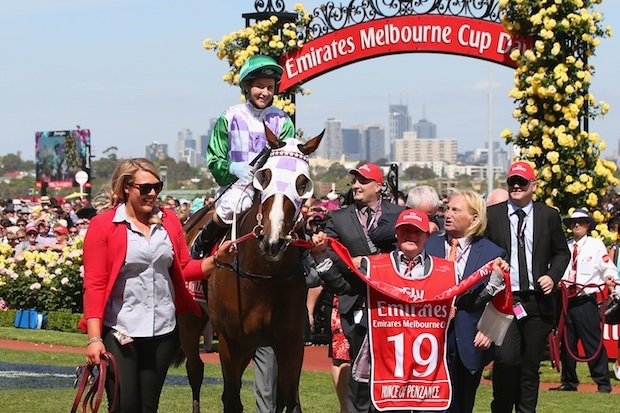But yesterday Michelle Payne proved them all wrong, by becoming the first ever woman to win the Melbourne Cup. What was her message to those who think female jockeys aren’t good enough? ‘Everyone else can get stuffed, because they think women aren’t strong enough, but we just beat the world.’
‘It’s a very male-dominated sport and people think we are not strong enough and all of the rest of it … you know what? It’s not all about strength, there is so much more involved, getting the horse into a rhythm, getting the horse to try for you, it’s being patient and I’m so glad to win Melbourne Cup and hopefully it will help female jockeys from now on to get more of a go. Because, I believe that we sort of don’t get enough of a go and hopefully this will help.’
The problem for many women jockeys – as she pointed out – is that many owners and trainers simply don’t want to take a chance on giving rides to a woman jockey. Even Payne said that ‘some of the owners were keen to kick me off’, but that trainer Darren Weir and the co-owner John Richards gave her a go ‘in such a chauvinistic sport’.
Of course getting – and keeping – rides is a problem for every jockey, but it does seem harder for women to get rides than men – probably because the owners and trainers lack faith in them. Hayley Turner is the most successful female jockey that British racing has ever seen, but earlier this year announced she was retiring from the sport, aged 32. She has since said that she made the decision to pursue a career in broadcasting. ‘Saying that I’m frustrated and no opportunities, I don’t think that’s fair, really… I get plenty of rides, I’m paying my mortgage.’
Despite that, it’s hard to argue that women have the same opportunities in racing as men. In the feature races in both flat and national hunt in the British Isles in the 12 months to June 2015, only 7 female jockeys took part. But with Katie Walsh’s win in the Irish Grand National in 2015 (making her the third woman ever to win the race), and Michelle Payne’s win yesterday, it just goes to show that women can win. It’s not just about strength – technique and knowing the horse are just as important. As Sally Rowley-Williams, Chair of Women in Racing, has pointed out, the women who have historically done well in racing are those who come from racing families, and who have therefore had the opportunity to get out there and ride.
Victoria Pendleton, the former Olympic cyclist, is currently in training to be a jockey, with the aim of riding in the Foxhunter Chase at this season’s Cheltenham Festival. Is this a good or a bad thing? Some argue that, as a famous name, she is depriving other jockeys of opportunities to ride that they may have worked harder (and longer) for. Others think that she’s no different from the many other amateur jockeys riding in races – and that her adoption of the sport will only be a good thing for the profile of both racing and women jockeys. Whatever the reality is, there’s no arguing with the fact that Michelle Payne’s triumph yesterday is fantastic for women jockeys – and proof that they can indeed beat the men.







Comments